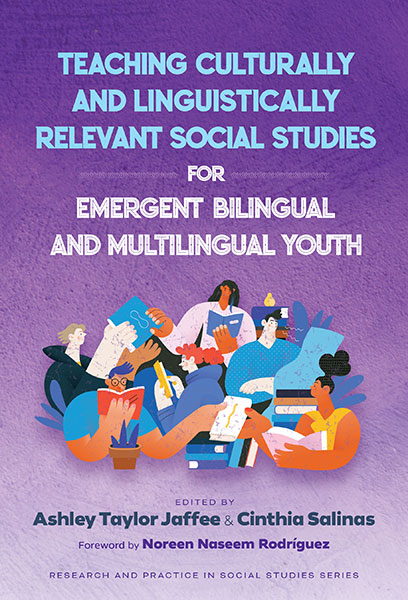Professors: Request an Exam Copy
Print copies available for US orders only. For orders outside the US, see our international distributors.
Edited by: Ashley Taylor Jaffee, Cinthia Salinas
Foreword by: Noreen Naseem Rodríguez
Publication Date: August 23, 2024
Pages: 256
Series: Research and Practice in Social Studies Series

“The book offers suggestions and ideas as to how teachers can change the social studies curriculum to heal from trauma and harm and instead focus on the celebration and sustainment of multiple languages.” —Journal of Education for Multilingualism
Through research, storytelling, curriculum development, and pedagogy, this book will help educators engage emergent bilingual and multilingual (EBML) students with social studies and citizenship education. Chapters are written by well-known and new scholars who are enacting teaching and research that center the needs, interests, and experiences of EBML youth.
Drawing from multiple, intersecting, and interdisciplinary frameworks that focus on culture and language, chapters highlight social studies in varying disciplinary and nondisciplinary spaces (e.g., community, geography, family, civics, history) both inside and outside the classroom. Examples of frameworks include culturally relevant and sustaining pedagogies, linguistically responsive teaching, LatCrit and critical pedagogy, translanguaging pedagogy, and transnational citizenship. This insightful volume also directly challenges oppressive structures, policies, and practices that continually marginalize EBML students and are rooted in racism, linguicism, and xenophobia.
This unique collection is designed for scholars, teachers, and teacher educators to actively read, reflect on, and enact the approaches shared by educators who are doing this work.
Book Features:
Ashley Taylor Jaffee is the assistant director of social studies and lecturer in the Program in Teacher Preparation at Princeton University. Cinthia Salinas is associate dean pro tem for educator workforce development at the College of Education and Ruben E. Hinojosa Regents Professor in Education in the Department of Curriculum and Instruction at the University of Texas at Austin.
”The book offers suggestions and ideas as to how teachers can change the social studies curriculum to heal from trauma and harm and instead focus on the celebration and sustainment of multiple languages.”
—Journal of Education for Multilingualism
“This edited volume centers the knowledges, experiences, histories, languages, and cultures of those students and communities that traditional social studies curricula typically erase or ignore, and notes implications for teachers and scholars moving forward. If social studies educators and researchers take the advice offered within these pages seriously, our collective futures will be much closer to the vision of liberty and justice for all that the United States purportedly aspires to achieve.”
—From the Foreword by Noreen Naseem Rodríguez, assistant professor of elementary education and educational justice, Michigan State University
“This book is a must-read for teacher candidates and educators, especially in current times when cultural practices and certain histories are being silenced across the nation. What makes this book special is that it devotes multiple chapters to teaching emergent bilingual and multilingual youth from multi-disciplinary perspectives to include family, community, and civic engagement through a culturally and linguistically relevant lens.”
—Christian Faltis, professor and chair, Texas A&M International University
“This timely volume is an invaluable resource for today’s civic educators. With contributions from new and seasoned scholars, the book's 14 chapters amplify the voices and strengths of linguistically diverse youth, sharing important and useful insights for educators striving to support the academic growth and civic engagement of emergent bilingual and multilingual students. This insightful volume is a major step forward for social studies education and essential reading for educators committed to inclusive, critically relevant civic learning.”
—Beth C. Rubin, professor of social studies education, Teachers College, Columbia University
Contents
Foreword Noreen Naseem Rodríguez, Michigan State University vii
Introduction Ashley Taylor Jaffee and Cinthia Salinas 1
Part I: Centering Emergent Bilingual and Multilingual Youth’s Experiences in Culturally and Linguistically Relevant Social Studies Classrooms and Schools
1. Translanguaging as Embodied Civic Practice: Centering Language in Civic Educational Practice and Research 19
Melissa Gibson
2. Leveraging Linguistic and Cultural Frames for Social-Spatial Understandings With Transnational Youth 34
Matthew R. Deroo, Jennifer Kahn, and Daryl Axelrod
3. A Newcomer Emergent Bilingual Learner Engaging in Social Studies Inquiry Through Translanguaging 51
Mina Hernandez Garcia
4. Cultivating Transcultural Civic Belonging in Hyper-Diverse Learning Spaces 72
Patrick Keegan
Part II: Examining Current Teachers’ Practices With Culturally and Linguistically Relevant Social Studies
5. Empowering Elementary EBML Students: A Collaborative Action Research Project Featuring a Teacher Educator and a Newcomer Teacher 87
Paul J. Yoder
6. Co-Constructing Language With Multilingual Youth in a Social Studies Classroom 100
Pablo C. Ramírez
7. A Critical Dialogic Approach to Centering Multiple Perspectives for Multilingual Learners in the American History Classroom 113
Vonna L. Hemmler, Colleen Fitzpatrick, Amanda K. Kibler, and Russell H. Carlock Jr.
8. Centering Emergent Bilingual Learners’ Cultures and Languages Throughout Social Studies Inquiry 129
Mary J. Schleppegrell, Rebecca L. D’Angelo, Mina Hernandez Garcia, and Chauncey Monte-Sano
Part III: Developing Future Teachers’ Understandings of Culturally and Linguistically Relevant Social Studies
9. Bridging Research and Practice: What Secondary Social Studies Teachers Need to Know When Working With EBML Youth 145
Alicen Brown, Michael Gurlea, and Michelle Hock
10. Centering and Mobilizing Transnational Funds of Knowledge of Emergent Bilingual Children in a Social Studies Teacher Education Classroom 164
Yeji Kim
11. Why Stories Matter: Using Latine Children’s Literature in Bilingual Elementary Classrooms to Advance the Civicness of Latine Communities 175
Melissa Rojas Williams and Pedro Berlanga
Part IV: Cultivating Foundations and Futures for Culturally and Linguistically Relevant Social Studies
12. Charting New Directions for Social Studies Research and Practice for Immigrant Students Affected by Undocumented Status 197
Jennifer M. Bondy
13. De Los Abajos: Rasquache Movidas Toward Critical, Culturally and Linguistically Relevant Social Studies 211
Tim Monreal, Jesús A. Tirado, and Saul Barrera
14. Curriculum Dreaming and Building Toward Freer Schools: Creating Humanizing Social Studies Classrooms for Multicultural and Multilingual Youth 224
M. Yianella Blanco
Notes 234
Index 237
About the Editors and Contributors 245
Professors: Request an Exam Copy
Print copies available for US orders only. For orders outside the US, see our international distributors.